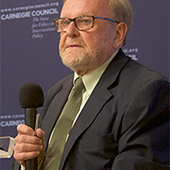We publish today the second set of papers under the U.S.-Russia strand of our U.S. Global Engagement Program.
These papers—two from Americans, two from Russians—embrace an ambitiously broad spectrum of issues, covering U.S./NATO-Russia cooperation on Afghanistan and Central Asia. Four major points may be seen to emerge from the spirited discussion in the papers:
1. The United States/NATO and Russia have clear and urgent common interests in promoting long-term stability in Afghanistan. These include containing and defeating "radical extremist" forces, reversing the noxious effects of the opium trade from that country, and preventing instability in Afghanistan from impacting an extended region. Despite these shared interests, cooperation between Russia and the West is "episodic," rather than strategic or systematic.
2. Afghanistan must be seen, not in isolation, but in a broader regional (Central Asian) context. This is true both in terms of the importance of the region (strategic location, energy resources) and of the formidable challenges (instability, economic reversals). Russia and the West both see advantages and interests to be protected (thus the recent competition for a military presence in the otherwise marginal Kyrgyzstan), but should avoid a new "Great Game" of promoting self-interest over shared concerns.
3. Afghanistan is now, as one paper writer states, "Obama's War." From campaign pledge to return to the "right" war, the President has: appointed new military and diplomatic leadership in Kabul, including a special envoy; invested in an enhanced troop presence; and made strenuous, if incomplete, efforts to drum up international support for the military and reconstruction effort in Afghanistan.
4. The very future of NATO may be viewed through the Afghan lens. The (lack of) commitment of NATO partners, given military and economic constraints, exemplifies the strains and stresses on an alliance that has expanded both geographically and in terms of mission. While the American and Russian paper writers differ considerably in their views of NATO's continuing relevance and role, even the American view of NATO as the most "successful" and "durable" military alliance in history is tempered by the urging to revisit and reconsider the original NATO treaty, which current challenges may be rendering obsolete.




